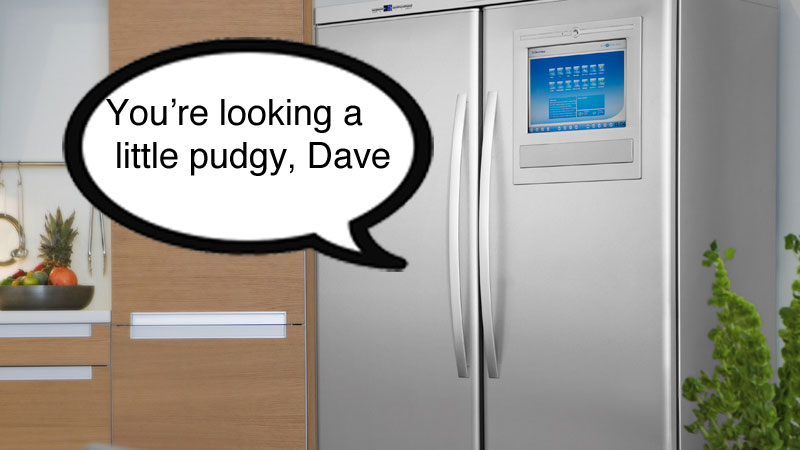What happens when our assistants are smarter than us?
You cannot be Siri-ous

Our personal digital assistants are getting smarter; Amazon and Microsoft recently announced that Alexa and Cortana will be able to talk to one another.
But we’re still in the very early days of artificial intelligence (AI), and their potential remains largely untapped. That’s changing, and it’s changing fast. As Microsoft CEO Satya Nadella told Fast Company “this is not all future. Volvo is using it today. Uber is using it today. [US home improvement store chain] Lowe’s is using it today”.
The sector is moving so fast, Nadella added, that “sometimes I get confused myself”.
If you thought getting Siri or Alexa to turn on the lights was pretty cool, you’ll be amazed by what the future could hold. According to Nadella, the digital assistants of the future could:
- Chide you about missing gym sessions or eating junk when you’re traveling
- Make cars safer by analysing motorists’ faces to check they’re awake and in a good mood
- Identify people for personal and commercial apps
- Combine your Pinterest pins with mixed reality to show recommended products in-situ
- Translate between languages instantly

And of course Microsoft, isn’t the only tech titan pushing AI into the mainstream. Amazon has done a superb job of getting Alexa into everything, Samsung has Bixby, Apple has Siri, Google has Google Assistant, and a whole bunch of companies are working on apps and chatbots to connect to them.
In the future, some of our best friends may be digital.
One ring to rule them all
Nils Lenke is Senior Director of Corporate Research at Nuance Communications, whose speech recognition system helped power both Siri and Samsung’s early voice assistant, S Voice.
Get daily insight, inspiration and deals in your inbox
Sign up for breaking news, reviews, opinion, top tech deals, and more.
Nuance’s cloud-based and embedded natural language technologies now power many smart devices and services.
“Virtual assistants will play a crucial role in the smart home,” he says. “As the number of connected devices rockets, the demands and expectations for smart devices will increase.
“Virtual assistants will play a crucial role in managing these different devices and making the consumer experience more intuitive and seamless.”
And that means having one ring to rule them all, not an army of smart devices that you’ll need to learn a new language to use effectively.
“Currently, many consumer devices have a specific name that causes them to react – for example, ‘OK Google’ – and specific ways of issuing commands,” Lenke says.

“But, when you have hundreds of different devices, it becomes extremely challenging for consumers to remember all the different ways of engaging with [them].
“Therefore, virtual assistants will play a crucial role in managing the wider smart home ecosystem. For example, understanding that when the user says ‘I’m cold’ it needs to turn up the connected thermostat.”
Our assistants will control our smart homes, entertain us in our self-driving cars and help us, well, just get stuff done. Lenke describes Alexa scanning your itinerary, checking with a rail provider to find the best route and price and automatically ordering e-tickets for you, or a work-based assistant reminding you of a task you’ve been putting off.
That’s the world that most of us expected: AI assistants doing the boring stuff at a mere quiver of our vocal chords. But what happens when our personal digital assistants become smarter than we are, and know more about us than our nearest and dearest?
Assistants: the next generation
For all their intelligence, current digital assistants are first-generation models: they’re okay with simple instructions, but aren’t great at understanding more complex things, or their wider context beyond location awareness.
They’re largely reactive, too: they wait until you ask them to do something, rather than anticipating your needs.
Lenke believes the personal digital assistants of the future will be much smarter than the ones of today, but only in specific scenarios.
“A virtual assistant in the car can be tailored to understand phrases that are commonly said within that environment, whether that’s checking whether there is free street parking, what the oil level is, or where to find a Chinese takeaway on the route home,” he says, whereas a customer service assistant doesn’t need to know any of those things.

“The more constrained to isolated domains they are, the better they will perform,” he adds. “Neural networks are good at many things, but once trained they can only perform the one task they have been trained for – recognizing faces, playing Go, or understanding speech – which is quite different from us humans. They don’t have their own will or even self-conscience.”
Actually, we’ll probably think our assistants are smarter than they actually are. “Psychologists call it the media equation theory,” Lenke explains. “We readily treat things like humans once they support some element of interaction, often grossly underestimating their true intelligence.”
Hands up if you say thanks when Siri or Cortana does something for you.
They don’t really care about us
One of the most interesting areas of progress is in empathy. Researchers from Stanford University and University of California, San Francisco tested Siri, Cortana, S Voice and Google Now to see how they responded to physical complaints and psychological distress, with researchers telling the digital assistants they were having heart attacks or felt suicidal.
The results weren’t brilliant, with variations on “I don’t understand” or useless quips about going outside for a break.
Since the study, the major players have improved the responses: they can point users to domestic violence hotlines, to sexual assault hotlines and to various kinds of medical services and 911.

Apparently, that’s just the beginning too – our assistants will increasingly help us look after our health. Give Siri access to your calendar and your wearables’ health data and it could detect patterns such as the unhealthy travel habits Sadya Nadella suggested earlier.
Google Home already connects to WebMD to offer health information, and hardware firms are investing heavily in wearable health tech and sensors. A Cortana that could keep an eye on elderly relatives would be very valuable.
Our assistants may even help us date: Alexa already works with dating site eHarmony to tell you about possible matches and shared interests. In the future she might do the virtual swiping on your behalf.

There’s a trade-off to all of that, though: in order for a personal digital assistant to be able to help with such personal issues, it needs to be given a lot of personal information.
To make assistants really good at understanding not just words but context and tone means providing the servers with many hours of your speech.
For cars to check our emotional states they’ll need to have cameras. For sensors to monitor vulnerable people we’ll be subjecting them to constant surveillance.
The potential privacy and security risks are significant: we’ve already seen US police attempt to subpoena Alexa as a murder witness.
Big Brother isn’t watching you, but Alexa might be
Not so long ago the idea of having an always-on microphone or camera in every home was the stuff of dystopian SF. Now we can buy one from Whole Foods such is the proliferation of this new wave of smart speakers in our homes.
But what if our assistants started to respond not just to commands, but to conversations? Do we want targeted ads for medicine when we tell our partner we’re feeling ill? How long before politicians demand access to our assistants’ recordings as well as our internet history?
If you think Facebook stores a lot of information, look what you could get from a virtual assistant that hooks into everything: where you’ve been, what you did, who you were with, what you talked about, how you got there, what your routines are, where you shop, what you eat… it’s the security services’ – and cybercriminals’ – ultimate fantasy.

“The assistants just act as an interface to existing technologies and make things (and their consequences) more visible,” Lenke says. “It is important that consumers consider the privacy policies of the companies whose devices they’re using.”
As he points out, some firms have very strict privacy policies, don’t sell data to marketers and don’t run shopping services; some other firms don’t, do and do, so it’s important to read up on what you’re actually offering up when using these services.
What the future holds
The good news is that our digital assistants probably won’t become smarter than us, because we won’t let them. A personal digital assistant that overrules you because it knows better is a personal digital assistant that’ll find itself dragged to the trash pretty quickly.
The real danger isn’t smart assistants, but incompatibility. As Lenke points out, if our assistants and devices aren’t interoperable “we humans will be overwhelmed by a multitude of new talking things, potentially all working differently”.
And while we’re clearly headed for an explosion in AI and bots, that explosion “won’t be accompanied by an increase in users’ attention capabilities,” he adds. ”Virtual assistants will need to be designed with this in mind.”
The digital age has barely begun, and AI is going to be a big part of it – so it’s important to make sure we know what we’re doing with all these assistants, and how they can really be of benefit, before we start sharing our every secret with them.
This article is brought to you in association with Vodafone.
Writer, broadcaster, musician and kitchen gadget obsessive Carrie Marshall has been writing about tech since 1998, contributing sage advice and odd opinions to all kinds of magazines and websites as well as writing more than a dozen books. Her memoir, Carrie Kills A Man, is on sale now and her next book, about pop music, is out in 2025. She is the singer in Glaswegian rock band Unquiet Mind.
